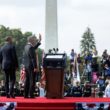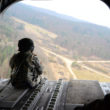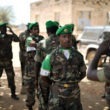With his nomination of Harriet Miers to be a Justice of the Supreme Court, George W. Bush has demonstrated once again that he is running a patronage operation in the White House. For high-level jobs with our government, only close friends or fellow ideologues need apply.
The result of this mindless favoritism has been a disastrous lack of control over some very important positions, leaving us vulnerable to internal as well as external catastrophes. It is not just the harm done to our international position, although that is serious enough. The past weeks have shown that inadequate management of the levers of government can leave American citizens in life-or-death peril.
In our May 1, 2004, issue, Margie Burns explored the role played by Bush insiders from the Project for the New American Century (PNAC), in deciding to invade Iraq in 2003. The invasion was not a “last resort,” as the president claimed, but had long been pushed for by Bush’s PNAC friends whom he appointed to key posts in the White House and the Pentagon.
Readers responded to her exposé so enthusiastically that we asked Burns to revisit PNAC’s influence in the Bush administration, this time focusing on domestic-security problems that remain unaddressed more than four years after 9/11.
Margie Burns teaches at the University of Maryland’s Baltimore campus and is a busy freelance writer.
“A serious and victorious war on terrorism will require a large increase in defense
spending. Fighting this war may well require the United States to engage a well-armed foe,
and will also require that we remain capable of defending our interests elsewhere
in the world. We urge that there be no hesitation in requesting whatever funds for defense
are needed to allow us to win this war.” — From PNAC’s September 20, 2001, letter to President Bush
on protecting America from terrorism
Looming threats to America’s domestic security have been pointed out ever since George W. Bush entered the White House, but his administration has still not moved to address them. The story can be traced back some years.
After the bombings at the World Trade Center in 1993, at the Oklahoma City federal building in 1995, at the Khobar Towers military barracks in 1996, and on the USS Cole in 2000, blue-ribbon panels, including the Hart-Rudman commission, were formed to investigate the emergence of new security threats in the post-Cold War world.
The Hart-Rudman commission published warnings in January of 2001 about lack of coordination among government agencies, lack of preparation for a guerrilla-style attack on America, and lack of intelligence about threats from small groups or networks. The commission’s report was followed up by media interviews, including a joint interview with the chairmen, former Senators Gary Hart and Warren Rudman, on January 31.
The White House did not follow the commission’s recommendations. On February 5, 2001, Bush chose for his new Deputy Secretary of Defense not a security expert but Paul Wolfowitz, a longtime aide to Vice President Richard Cheney. Along with Cheney and Defense Secretary Donald Rumsfeld, Wolfowitz was a member of a group calling itself the Project for the New American Century, or PNAC.
PNAC’s focus has always been on supporting U.S. military expansion, supporting action against Iraq and supporting “Star Wars” missile-defense and space-weapons programs, including nuclear weapons. But PNAC’s, and the Bush administration’s, interest in military expansion was never matched by a corresponding interest in either domestic security or international diplomacy.
On March 2001, Russia’s foreign minister, Igor Ivanov, told reporters that Russia was still waiting for a new person to be appointed to replace former ambassador and former Undersecretary of State Thomas Pickering on the Russia-U.S. Working Group on Afghanistan, so that Russia and the U.S. could cooperate on terrorism. The Working Group never reformed and was superceded by the invasion of Afghanistan after 9/11.
THE LEAD-UP TO 9/11—On May 4, 2001, the United States was voted off the United Nations Human Rights panel, a loss that has resonated particularly in the prisoner abuses revealed to have taken place at Abu Ghraib in Iraq and at other U.S. military prisons. Also in May, the White House rejected the recommendations of several distinguished panels regarding domestic terrorism. Among the panels’ findings was that there were 46 different agencies in the U.S. government responsible for responding to terrorism. As we have now seen, in the aftermath of Hurricanes Katrina and Rita, the need for coordination among federal agencies, and for coordination of federal agencies with local and state entities, has still not been addressed.
The increased security warnings in early 2001 did, however, lead to an announcement, on May 8, that Vice President Cheney would be taking the reins of a new task force to study domestic terrorism. The existing terrorism-management structures would stay in place (except for some inter-agency working groups that Bush abolished); but an office of national preparedness and a task force under Cheney would look at federal, state and local anti-terrorism efforts. As Secretary of State Condoleezza Rice and others eventually testified to the independent 9/11 Commission, the task force, ironically, was scheduled to make its initial report in the first week of September 2001.
While both security and diplomacy continued to be back-burner issues for the Bush White House, PNAC members kept up their longtime campaign to expand U.S. military dominance, to increase military spending, and to maintain an aggressive presence in the Middle East.
On March 21, 2001, PNAC chairman William Kristol, testifying at a congressional hearing on defense, rejected the idea that the end of the Cold War meant the United States had received a “peace dividend.” Citing a September 2000 report by PNAC member Thomas Donnelly (a white paper titled “Rebuilding America’s Defenses”), and also citing a much-criticized 1992 strategy paper prepared under Wolfowitz for then-Defense Secretary Cheney, Kristol expressed regret that the first Bush White House had backed off a policy of military expansion. Kristol stated repeatedly that money for the military should be this nation’s first priority. Appropriate the military funding first, he urged, even if we have to figure out how to spend it later. He also said that the U.S. should not be too afraid of “nation-building.”
OF THE CRONIES, BY THE CRONIES—As previously reported in the Washington Spectator, it was PNAC members who tended to be named to sensitive security positions in George W. Bush’s administration, rather than longtime experts on security. These were people whose ideas were close to Bush’s heart. PNAC consistently advocated using the military to attain national-security objectives and defined those objectives in terms of corporate interests.
This tendency in hiring has exposed the nation to considerable risk. Instead of going to seasoned professionals, crucial government posts have gone to undiluted ideologues with extreme views (or else to presidential pals in line for a favor). Our foreign and domestic vulnerabilities now demonstrate the result.
PNAC influence in the administration has been remarkably broad. Along with PNAC founders Cheney, Rumsfeld, and Wolfowitz, who has since gone off to the World Bank, members in government include Cheney’s Chief of Staff, I. Lewis Libby. Libby has recently been questioned in the investigation of who leaked the information that former ambassador Joseph Wilson’s wife, Valerie Plame, was a CIA operative. Judith Miller, a New York Times reporter jailed for three months for refusing to speak to prosecutors about her knowledge of the Plame matter, was released from prison on September 29 after agreeing to testify. She testified the next day, and the Times reported that her source was Libby.
PNAC member Peter Rodman was named Assistant Secretary of Defense for International Security. A member named Dov S. Zackheim was appointed Comptroller in the Department of Defense. (When Congress undertook an investigation of the no-bid defense contract given to energy services and construction company Halliburton, Zackheim’s testimony was so favorable that Halliburton posted his statement on its corporate website.) PNAC colleague Robert B. Zoellick was appointed Deputy Secretary of State.
Another PNAC member is John R. Bolton, formerly Undersecretary of State for Arms Control and International Security and now U.S. Ambassador to the United Nations. Bolton, whose career has been characterized by heated clashes with subordinates, repeatedly lashed out at the U.N. in the years prior to his diplomatic appointment. In a 1994 speech, he declared that “there is no such thing as the United Nations,” and suggested that lopping off ten stories from the U.N. building in New York would make no difference. Bolton’s connections include financial and other ties to Taiwan. In 2001, as the State Department undersecretary responsible for reducing weapons proliferation, Bolton opposed any initiative of the U.N. to regulate trade in small arms, non-military rifles or any other non-military weapons.
Randy Scheuneman, another PNAC member, was president of the Committee for the Liberation of Iraq, a lobbying group largely funded by donors, including defense and security contractors, that pushed ardently for removing Saddam. The committee includes several other PNAC members.
Following the invasion of Iraq, PNAC member and Undersecretary of Defense for Intelligence Stephen Cambone was named by Wolfowitz to head the Iraq Survey Group, an organization created to hunt for Iraqi chemical and biological weapons. Discredited by the failure to find Iraq WMDs, Cambone, along with Wolfowitz, was later called to testify before Congress as a witness when the Abu Ghraib abuses were discovered.
PNAC member R. James Woolsey, a former CIA director, has past connections with the Titan Corporation, one of the companies involved in the Abu Ghraib scandal. Woolsey is Vice President of the Global Strategic Security Division at Booz Allen Hamilton, one of the largest Iraq contractors.
The nexus of big-time force, big funding and controlled information that produced the Iraq War and its aftermath does not operate in a subtle manner. When the United Nations did not unequivocally endorse Bush’s plan for regime change in Iraq, Wolfowitz in 2002 ordered a CIA report on Hans Blix, the chairman of UNMOVIC, the U.N. commission that inspected Iraq’s WMDs. Wolfowitz reportedly “hit the ceiling” when the CIA didn’t report any dirt on Blix, whose balanced and meticulous approach to inspections has long since been vindicated. Meanwhile, Blix and the U.N. were subjected to a continuous barrage of criticism from Bush officials and from their allies in the media, including such commentators as PNAC member Charles Krauthammer, who appears weekly on ABC TV and is syndicated by the Washington Post.
It is widely known that Wolfowitz, before he left for the World Bank, and his boss Donald Rumsfeld oversaw control of a stream of intelligence reporting on Iraq. They relied heavily on the reports of the exiled Iraqi businessman Ahmed Chalabi, who before the war was head of a group called the Iraqi National Congress and was considered a possible successor to Saddam; today he is a deputy prime minister in the Iraq government. Chalabi attempted to tie Saddam to Al Qaeda and to weapons of mass destruction. His WMD charges included the use of some documents obtained through Italy that proved to be forgeries. When the Chalabi material was questioned by the CIA and the Defense Intelligence Agency (DIA), Rumsfeld responded by bypassing established channels and setting up his own intelligence analysis unit.
Administration officials who downplayed genuine, useful intelligence and genuine diplomacy, and who vehemently opposed any attempt to question or to investigate their foreign policy assumptions, also managed to turn a blind eye to the predictable post-invasion problems, creating the calamitous situation in Iraq today.
LUST FOR OIL—From the start of the George W. Bush administration, public bellicosity and provocative public rhetoric regarding the Middle East have been accompanied by a behind-the-scenes financial strategy; it also has pushed intervention, generally with a significant corporate component and virtually always with significant input from Bush personnel drawn from PNAC.
It has already been reported that Rumsfeld and Wolfowitz were largely behind the 1998 “Iraq Liberation Act,” which earmarked millions of dollars for the Iraqi opposition, mostly for Chalabi’s group. The Clinton administration disbursed very little of the money. In February 2001, Ahmed Chalabi met with Bush’s Assistant Secretary of State for Near East Affairs, Edward Walker, and came out saying that he had permission to spend millions funded under the act. By February 8, when Bush had been in office two weeks, the Treasury had authorized the release of $4 million to finance the Iraqi opposition movement, the first such funding since the previous Bush administration.
To the extent that the Bush White House, from its first days, believed there were any security concerns to focus on, they were voiced mainly as a need for “energy security,” a favorite phrase with the administration. Through January and February 2001, the White House repeatedly expressed this concern, sometimes using the California energy crisis (before Enron’s market manipulations became widely known) as a reminder. Usually the need for “energy security” was cited in support of priorities like drilling in the Arctic and additional coal mining.
Yet there is more than a suggestion, given key personnel appointments, that the White House agenda was not less dependence on, but more control of, foreign oil. Thus there was no emphasis on conservation of resources or of reduction in demand. Quite the reverse: the White House’s huge military-spending bonanza, its emphasis on consumer spending to boost the economy, and its tax cuts to promote more conspicuous consumption, had the effect of promoting more oil-guzzling than ever.
Cheney and other administration officials, together with their industry friends, pushed for more drilling on federal land in the spring of 2001, saying we should not put our national energy security in the hands of foreign nations. That argument was not used, however, to deter U.S. oil companies like Condoleezza Rice’s former company, Chevron, or Cheney’s former company, Halliburton, from dealing with the Saudi or Kuwaiti royal families, or with Saddam Hussein. In their eagerness to establish “energy security” effectively by taking over another country’s resources, they established a track record of official distortions unparalleled since the Vietnam era.
With the Iraq War going as badly as it is (and our national life under pressure too), a reasonable administration would divest itself of the people so closely linked with its failed policies. So far, however, that has not occurred. Instead, most of the individuals closely linked with a discredited military adventurism have been either retained or promoted. Their treatment suggests that the White House dare not fire them, for fear of retaliation by exposure. After all, these individuals themselves must know better than anyone else the full extent of the administration’s failures.






0 Comments